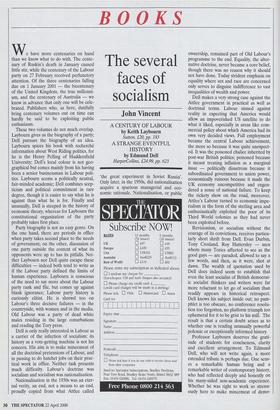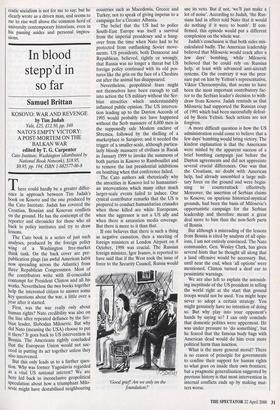BOOKS
The several faces of socialism
John Vincent
We have more centenaries on hand than we know what to do with. The cente- nary of Ruskin's death in January caused little stir, while the centenary of the Labour party on 27 February received perfunctory attention. Of the three centenaries falling due on 1 January 2001 — the bicentenary of the United Kingdom, the true millenni- um, and the centenary of Australia — we know in advance that only one will be cele- brated. Publishers who, as here, dutifully bring centenary volumes out on time can hardly be said to be exploiting public enthusiasm.
These two volumes do not much overlap. Laybourn gives us the biography of a party; Dell pursues the biography of an idea. Laybourn spices his book with recherché information about West Riding politics, for he is the Henry Pelling of Huddersfield University; Dell's local colour is not geo- graphical but comes mainly from his having been a senior businessman in Labour poli- tics. Laybourn seems a politically neutral, fair-minded academic; Dell combines scep- ticism and political commitment in rare degree, though it is easier to say what he is against than what he is for. Finally and unusually, Dell is steeped in the history of economic theory, whereas for Laybourn the constitutional organisation of the party probably takes first place.
Party biography is not an easy genre. On the one hand, there are periods in office when party takes second place to the needs of government; on the other, discussion of one party outside the context of what its opponents were up to has its pitfalls. Nei- ther Laybourn nor Dell quite escape these difficulties — indeed both tend to write as if the Labour party defined the limits of human experience. Laybourn is conscious of the need to say more about the Labour party rank and file, but comes up against blank ignorance; Labour party history is curiously elitist. He is shrewd too on Labour's three decisive failures — in the countryside, with women and in the media. Old Labour was a party of dead white males residing in the large conurbations and reading the Tory press.
Dell is only really interested in Labour as a carrier of the infection of socialism: its history as a vote-getting machine is not his concern. His aim is to make mincemeat of all the doctrinal pretensions of Labour, and in passing to do hatchet jobs on their prac- tical work in office. Neither task presents much difficulty. Labour's doctrine was socialism and socialism was nationalisation.
Nationalisation in the 1930s was an eter- nal verity, an end, not a means to an end, proudly copied from what Attlee called `the great experiment in Soviet Russia'. Only later, in the 1950s, did nationalisation acquire a spurious managerial and eco- nomic rationale. Nationalisation, or public ownership, remained part of Old Labour's programme to the end. Equality, the alter- native doctrine, never became a core belief, though there was no reason why it should not have done. Today strident emphasis on equality where sex and race are concerned only serves to disguise indifference to vast inequalities of wealth and power.
Dell makes a very strong case against the Attlee government in practical as well as doctrinal terms. Labour sinned against reality in expecting that America would allow an impoverished US satellite to do what it liked, especially in areas like com- mercial policy about which America had its own very decided views. Full employment became the central Labour achievement, the more so because it was quite unexpect- ed. It was the poisoned chalice inherited by post-war British politics; poisoned because it meant treating inflation as a marginal issue — politically disastrous because it subordinated government to union power, economically ruinous because it made the UK economy uncompetitive and engen- dered a sense of national failure. To keep the rickety show on the road, moreover, Attlee's Labour turned to economic impe- rialism in the form of the sterling area and enthusiastically exploited the poor of its Third World colonies as they had never been exploited before.
Revisionism, or socialism without the courage of its convictions, receives particu- larly short shrift from Dell. Evan Durbin, Tony Crosland, Roy Hattersley — men whom many Tories affected to see as the good guys — are paraded, allowed to say a few words, and then, as it were, shot at dawn. The wealth of quotation used by Dell does indeed seem to establish that even the least socialist of British democrat- ic socialist thinkers and writers were far more reluctant to let go of socialism than readily appears in historical retrospect. Dell knows his subject inside out; no pam- phlet is too obscure, no conference resolu- tion too forgotten, no platform triumph too ephemeral for it to be grist to his mill. The result is that a certain doubt arises as to whether one is reading unusually powerful polemic or exceptionally informed history.
Professor Laybourn deserves the grati- tude of students for conciseness, clarity and excellent arrangement. To Edmund Dell, who will not write again, a more extended tribute is perhaps due. One sens- es a remarkable human being and a remarkable writer of contemporary history, who had reflected deeply and honestly on his many-sided non-academic experience. Whether he was right to work so strenu- ously here to make mincemeat of demo- cratic socialism is not for me to say; but he clearly wrote as a driven man, and seems to me to rise well above the common herd of university contemporary historians, even in his passing asides and personal impres- sions.



























































 Previous page
Previous page